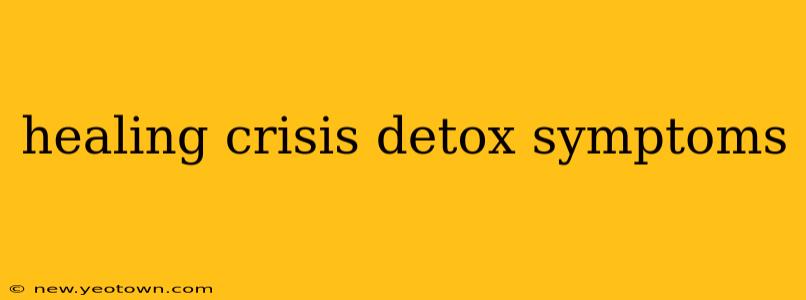The human body is a remarkable machine, constantly working to maintain balance and equilibrium. But sometimes, when we embark on a journey towards better health – whether through a change in diet, starting a new exercise regimen, or undergoing a detox – we might experience what's often called a "healing crisis." This isn't necessarily a bad thing, but understanding what to expect can make the process much easier. Think of it as your body's way of releasing accumulated toxins and imbalances, a necessary step on the path to wellness. This article will delve into the world of healing crises and detox symptoms, helping you navigate this sometimes bumpy road to better health.
What is a Healing Crisis?
Imagine your body as a garden that’s been neglected. Weeds (toxins) have grown rampant, obscuring the beautiful flowers (your health). When you start tending to the garden – cleaning it, adding nutrients, and removing the weeds – you might initially see more weeds than flowers. That’s essentially what a healing crisis is. It's a temporary worsening of symptoms as your body begins to eliminate accumulated toxins and restore balance. These symptoms can range from mild to more intense, depending on the individual and the depth of the imbalance.
Common Detox Symptoms During a Healing Crisis
The symptoms experienced during a healing crisis can vary widely, but some common signs include:
- Fatigue: Feeling unusually tired is a very common sign. Your body is working hard to eliminate toxins, and this process is energy-intensive.
- Headaches: Toxins can build up in the body and cause headaches, especially during the initial stages of detox.
- Muscle aches and pains: Similar to headaches, muscle aches can be a result of the body releasing toxins.
- Skin issues: Breakouts, rashes, or other skin problems can occur as toxins are eliminated through the skin.
- Digestive upset: This can manifest as bloating, gas, diarrhea, or constipation. Your digestive system is working overtime to process and eliminate waste.
- Emotional upheaval: Many people report experiencing mood swings, increased anxiety, or irritability during a detox. This is because toxins can affect the nervous system.
- Increased mucus production: The body may try to eliminate toxins through the respiratory system, leading to increased mucus.
- Sleep disturbances: Your body's natural rhythms may be disrupted, leading to insomnia or difficulty sleeping soundly.
How Long Do Healing Crisis Symptoms Last?
This is a common question, and the answer unfortunately isn't straightforward. The duration of a healing crisis varies greatly depending on several factors:
- Individual health status: Someone with more deeply rooted health issues may experience a longer and more intense healing crisis.
- Type of detox: Different detox methods (e.g., juice cleanse vs. dietary changes) can lead to varying symptom durations.
- Body's ability to eliminate toxins: Factors like liver and kidney function play a significant role.
Generally, symptoms should lessen over time as your body adapts and eliminates more toxins. If symptoms persist for an extended period or become severe, it's crucial to consult a healthcare professional.
Are Healing Crisis Symptoms Dangerous?
While uncomfortable, healing crisis symptoms are rarely dangerous in themselves. They are often a sign that your body is doing its job and working towards improved health. However, it’s crucial to pay attention to your body and seek medical advice if:
- Symptoms are severe or debilitating.
- You experience a sudden and unexplained change in health.
- You're concerned about your symptoms.
How to Support Your Body During a Healing Crisis
While navigating a healing crisis, it's essential to be kind to your body and support it through this process:
- Hydrate: Drink plenty of clean water to help flush out toxins.
- Rest: Allow your body adequate time to rest and recover.
- Eat nutritious foods: Focus on a whole-foods, plant-based diet that supports your body’s detoxification processes.
- Manage stress: Stress can worsen symptoms. Practice relaxation techniques like meditation or deep breathing.
- Listen to your body: Pay attention to your symptoms and adjust your routine accordingly.
- Seek professional guidance: If you're concerned or unsure about your symptoms, consult a healthcare professional or holistic practitioner.
Remember, a healing crisis is a sign your body is working towards better health. By understanding what to expect and taking steps to support your body, you can successfully navigate this process and reap the rewards of improved well-being. This journey is personal, and while this information provides guidance, individual experiences may vary. Always consult with a healthcare professional before starting any new detox or health regimen.

